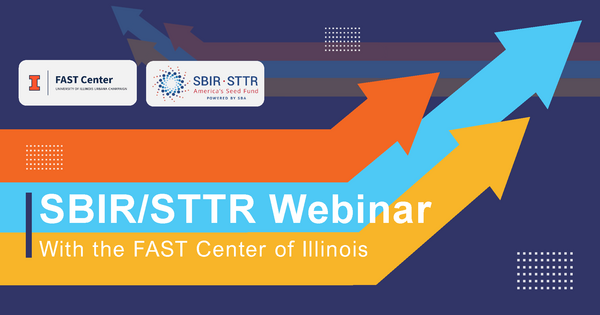
SBIR/STTR Webinar: Demystifying NSF SBIR/STTR: A webinar with NSF Program Director, Dr. Ben Schrag
- Event Type
- Seminar/Symposium
- Sponsor
- Illinois FAST Center
- Date
- Jun 10, 2025 2:00 - 3:00 pm Central Time
- Contact
- Illinois FAST Center
- il-fast-training@lists.illinois.edu
- Views
- 285
- Originating Calendar
- FAST Center of Illinois Calendar
Join us on June 10 from 2:00 - 3:00 pm (CT) for a unique opportunity to hear directly from Dr. Ben Schrag, SBIR/STTR Program Director at the National Science Foundation (NSF), and learn what it really takes to earn non-dilutive federal funding for your startup.
TOPICS COVERED:
🔹 What NSF looks for in your Project Pitch & Full Proposal
🔹 How to position your company and technical innovation
🔹 What not to worry about (really!) when applying
🔹 The proposal review process and key decision points
🔹 Tips for transitioning from Phase I to Phase II and beyond
🔹 When and how to engage with a Program DirectorWhether you're just exploring the program or preparing a resubmission, this session will give you clarity, confidence, and actionable strategies.
FREE TO ATTEND - Register here: https://forms.illinois.edu/sec/1091563422
After the presentation, teams will have the opportunity to ask questions from the FAST team. Office Hours are also available by signing up online.
Important: This is a free, virtual event, but two steps are required to complete your registration:
1️⃣ First, complete the FAST Center registration form.
2️⃣ Then, click the Zoom registration link (shown after you submit the form or included in your confirmation email) to receive your unique link to join the webinar.Please note: You must have a Zoom account set up prior to registration. Please use the email address associated with your Zoom account to access the webinar room.
Recording Notice: By registering for this webinar, you acknowledge and agree that it will be recorded and shared online for public viewing.
For more information and how to access more resources, visit the FAST Center at Illinois website.
The Small Business Innovation Research (SBIR) and Small Business Technology Transfer (STTR) programs are highly competitive programs that encourage domestic small businesses to engage in Federal Research/Research and Development (R/R&D) with the potential for commercialization. Through a competitive awards-based program, SBIR and STTR enable small businesses to explore their technological potential and provide the incentive to profit from its commercialization. By including qualified small businesses in the nation's R&D arena, high-tech innovation is stimulated, and the United States gains entrepreneurial spirit as it meets its specific research and development needs.
